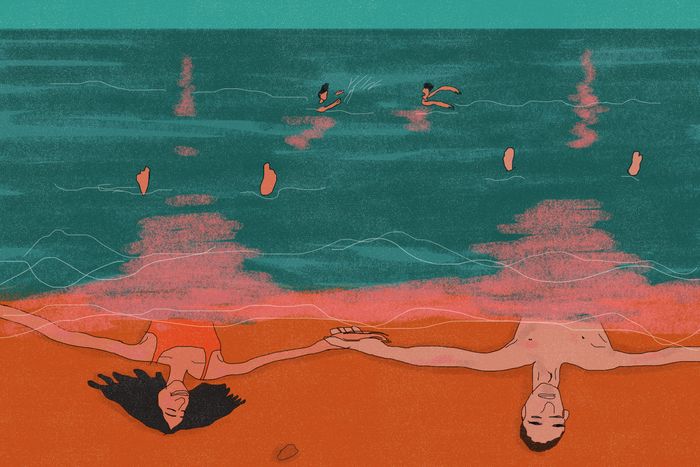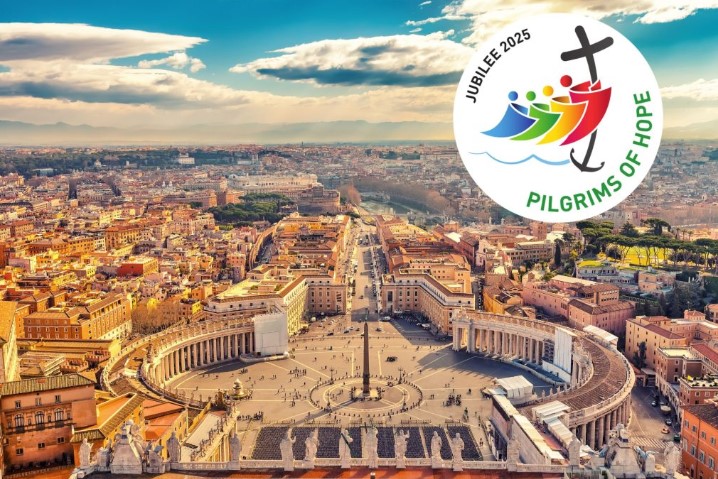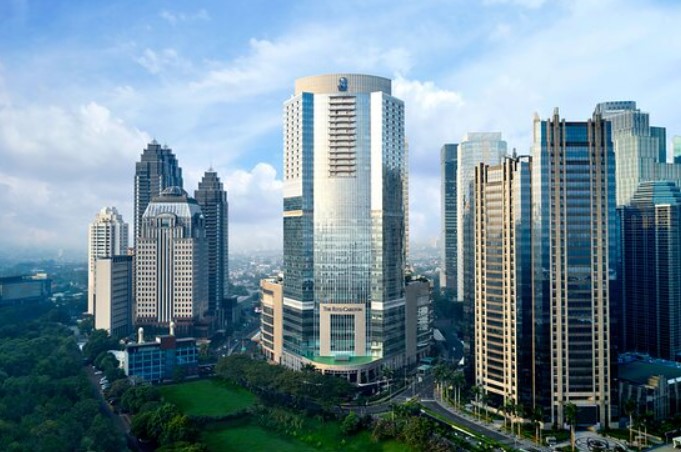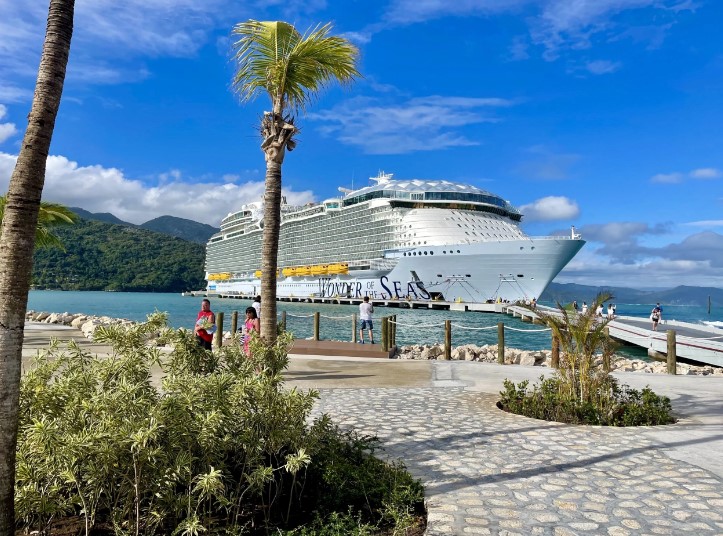
Illustration: Hannah Buckman
Over the last decade, I’ve become experienced at something that, despite my expertise, I don’t discuss much: vacationing while broke. Based on what I know about economic trends, I’m in good company. It’s expensive out there this summer — food, gas, all of it.
Traveling while broke is one of the high-wire acts of modern life, and I wish we talked about it more, because almost everyone is doing it.
It’s one thing to be broke when you’re young and unattached, but once you’re traveling with kids, the narrative changes and the glamor of improvisation vanishes. There can be acute shame in vacationing as a family with little money, and the only reason I’m writing about it now is that I’m not broke anymore.
For parents, vacations are supposed to be the reward for all of our hard work and responsible planning. Being a parent while on vacation means modeling competence and organization. There are stakes: Everyone’s supposed to have fun and relax. If the parents are stressed, the vacation is a bust. That’s science.
Due to the dizzying buffet of economic circumstances in our times, depending on whom we’re visiting, we’ve held the status of both the “poor cousins” and the bougie city folk — sometimes over the course of the same summer. I’ve experienced the dramatic tension of both roles: silently marveling at the abundance of a friend’s snack drawer, thrilling the hosts with offerings of wine and Ben & Jerry’s.
Broke-ness is highly subjective, of course. Millions of families simply can’t leave their homes — no time off, no reliable car, not enough money for gas, no one with a spare room. My family has always had a car (often, it has needed work at some point while on the road, an eventful hiccup that never fails to throw me into a frenzy of dread and self-loathing), and we’ve usually been working in some capacity in academia, which means there’s time off. Every summer, we hit the road.
More than once, we’ve gone into the red from buying lobsters fresh off the boat or a round of sundowners while the kids play on the beach. We’ve treated ourselves to date-night dinners that we could not afford while the grandparents watched the kids. Who can pass up free babysitting?
Some readers unfamiliar with this terrain might wonder, Why stress yourself out like this? Why not just eat sandwiches, drink Bud Light, and save yourself the stress? Why not be frugal and virtuous? Most of the time, that’s what we’ve done. Packing sandwiches in a sticky Costco cooler bag has long been the final step before leaving on a trip. But as backward as it may sound, sometimes people splurge on things they can’t afford as a way of saying “Fuck you” to their precarious condition.
In a culture that equates luxury with power, to consume luxury is to show the world, and yourself, that you have a bit of power too. Some people might think this behavior is highly irresponsible, and I gently suggest that they kill the cop within.
In one of my favorite novels of the past five years, The Golden State, by Lydia Kiesling, a mother named Daphne hits the road with her toddler, Honey. Daphne is a low-level administrative officer at a university — the same job I was doing when the book came out in 2018. It’s a road-trip adventure story, but Daphne only has a little more than $1,000 in her bank account, and she spends the trip mentally tallying her balance as she buys herself dinner and fills the gas tank. The Golden State was the first and last time I’d seen my financial circumstances reflected in writing. And yet, we low-level administrative officers hanging on to the middle class are legion.
Thirty years ago, travel was not so fraught with class anxiety. Now we can travel alongside a small, highly visible demographic vacationing in hyperluxury while pretending that it’s normal to be insanely rich.
In New England, where a lot of our broke travel has taken us, motels are now mostly for people who can’t find stable housing, not for vacationers. Airbnbs are barely affordable unless you’ve got a posse of best friends ready to share the bathrooms and the expense. Camping used to be a cheap option, but even this has become a minefield of consumer choice. Years ago, we spent thousands of dollars on wilderness-camping equipment that makes camping in affordable backcountry areas possible, but the investment was major. Most people can’t afford quality camping gear.
There is no dignity in sleeping on the ground when a mere $300 will get you an extremely packable self-inflating mattress from Switzerland. Tossing and turning on a leaking old Therm-a-Rest, the broke parent’s mind inevitably turns to the friends with a lake house inherited from their parents and what it would take to score an invite next summer.
What I love about broke travel is that the good parts are really good — the highs feel extra high, because they represent the overcoming of some very present lows. Most of our built environment is organized around extracting money from us and making us feel bad if we can’t afford things; breaking free of that cage, even briefly, feels like being truly alive.
Broke people travel the world in droves — eating out of Tupperware and wax paper, watching the sunset from the tailgate in the emptying parking lot of the public beach. Because far more people travel broke than rich, it feels odd to give advice on how to do it. Truly, ask anyone. Mostly, it’s a matter of having fun in the dwindling public spaces afforded us by our landscape. Bring little bouncy balls everywhere you go. Let your children attempt to scale public monuments. Loiter for as long as possible in places with shade. Even the most remote towns have elementary schools with rusty monkey bars out back. I can’t say it’s the most fun I’ve ever had, but hanging around abandoned schoolyards got me and my kids through some crucial summer hours over the years. Resist the habit of organizing your days around activities and, instead, try to slowly explore the weird interstitial spaces in cities and towns on foot. If most of this sounds like “behaving eccentrically in public,” maybe that says something disappointing about how rigorously our public spaces structure our behavior.
Minor-league baseball in cities and beer-league softball in towns is cheap, fun, and almost always happening during the summer. A few years ago, we spent the night in Edmundston, New Brunswick, on our way to Prince Edward Island to visit my mother-in-law. (Shout-out to NB, Canada’s best province to travel through even though parts of it are incredibly boring and largely owned by the Irving corporation.) Wandering around during the magic hour after we’d checked into the Travelodge (which had a pool — if you’re going to stay in a hotel with kids, obviously a pool is a huge deal), we came upon a men’s softball game. We ate hot dogs and chips for dinner in the stands alongside the teammates’ families and friends and cheered for the team visiting from Rivière-du-Loup. Fond memories for all!
I have a friend who is one of the rare breed of rich people who will actually talk about what it feels like to be rich rather than pretending that their life is normal. (If you have a friend like this, treasure them and ask them a million questions so they never stop feeling weird about how rich they are.) Recently, she told me she’s done with luxury boutique hotels, because they cost more than their capacity to provide good service. At more than $1,000 per night, one expects an experience that erases time and smooths the brain, but that’s simply not possible. And given staffing shortages, little snafus and imperfections are inevitable. When you’re spending a lot, a stupid inconvenience like a botched room-service order or an undelivered drink can send a person into an idiotic tailspin of entitlement and rage, which is humiliating and dehumanizing to everyone involved. It’s a sickness. Someone who would never act like a martinet at a campground finds herself complaining to management over something that objectively doesn’t matter. Why even put yourself in that morally compromised position in the first place? So she has stopped staying at hotels that cost more than your average airport Hilton, and she may never go back.
I asked this friend what it feels like for a truly rich person to travel. How fun is it, really? Is it actually no-stress? What is going through the head of a dad calmly piloting his G-wagon to the valet station?
She told me that the best part of traveling while rich is the brief flashes when you feel, deep in your lizard brain, that you have what everyone else wants. Everyone is fighting for their lives for the thing that you have. If that sounds sick, that’s because it is, and my friend admits this. But most of the time, being rich is a matter of being slightly poorer than another rich person who can have an even nicer thing. The hedonic treadmill has room enough for us all.
It’s odd to me that rich people act surprised when their kids come to expect the trappings of wealth. Children are not inherently pure of heart: They like fancy shit just as much as — probably more than — adults. But just as they like fancy stuff, they love roasting marshmallows and exploring unfamiliar public parks. The only reason broke travel is a problem for kids is that it can lead to stress for the adults. Kids love fast food and gas-station snacks.
This past winter, my family decided to try something that we’d never been able to afford before: two nights at a “winter resort,” L’Auberge du Lac-à-l’Eau Claire, the likes of which are popular in Québec among families of means.
A few weeks before the trip, I called to book a dogsledding excursion for my family. I felt pretty good about this. Making memories for my kids!
When we arrived at the auberge, it turned out I had booked the dogsledding at a different auberge, Pourvoirie du Lac Blanc, about 30 kilometers away. I, a moron, had called the wrong one to book.
Those few hundred bucks down the drain completely devastated me, even if they didn’t devastate my finances. My kids were disappointed but got over it in about ten minutes, but I suffered for much longer. The emotional labor required of my husband to bring me back from the brink was, let’s just say, substantial. Beyond feeling stupid about the wasteful mistake, I suspected that expensive travel had already had the effect of rotting my brain, of robbing me of my diligence and vigor, of making me lazy and decadent. I felt more shame for having wasted the money than I ever felt about being broke. I felt like I’d been swallowed whole by the moral quagmire of consumer capitalism, which might sound melodramatic, and believe me, it was.
After a lot of thought, I came to the conclusion that the ideal way to experience luxury while traveling with your family is to sneak into a hotel pool. Let the kids splash around for a bit while you relax on a chaise longue. If it’s the kind of ultranice place with a pool bar, order a drink and pay for it out of your dwindling checking account (charging things to fictitious rooms is something that does not work in real life, trust me). The kids will learn a lesson in the importance of looking like you belong somewhere you don’t, and you’ll experience the high of getting something for nothing which, in this economy, is the best drug there is.






More Stories
6 Iconic Photo Spots Located in Jakarta’s SCBD Area
5 priciest South Carolina vacation home rentals on Vrbo
How All-Inclusives Redefine Luxury Vacations: Travel Weekly